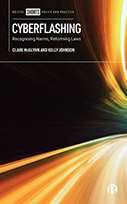Cyberflashing: Recognising Harms, Reforming Laws

Authors: Clare McGlynn & Kelly Johnson
Publisher: Bristol University Press, 2021. 160 pages
Reviewer: Dean Fido ǀ November 2021
Clare McGlynn’s and Kelly Johnson’s latest offering is a vital first step in drawing attention to the phenomenon of cyberflashing, which, although it is experienced by women every day is nonetheless poorly understood and researched using an academic lens. As such, this book should be received well by academics and the general public alike (including victims and/or survivors of cyberflashing themselves).
Cyberflashing is split into two core parts: ‘Recognising Cyberflashing’ and ‘Reforming the Criminal Law’. In the former, a lot of space is given to the clear and explicit delineation of the core terminology required to properly engage with the book – which is always a positive sign – whilst seamlessly framing cyberflashing as a manifestation of image-based sexual abuse more broadly. As such, this work both establishes itself as a new and novel area of investigation and interest, whilst also reviewing the existing literature. In the latter, the authors explore the current legal status of cyberflashing across the globe, and in doing so identify limitations and constraints which prevent the effective safeguarding of victims of cyberflashing and other online abusive behaviours. Of great interest, they draw comparisons between Singapore and Texas (USA), where explicit cyberflashing legislation already exists. The authors present a reasonably damning view of current legislation across most of the world. This might come as a surprise to both academics and the general public who might have thought otherwise. The book closes by offering hope to victims of cyberflashing, by drawing on McGlynn’s legal knowledge in the delineation of a series of recommendations for law reform in this area.
Given the sparse literature on the topic of cyberflashing, I was interested to see how the authors would present this work, and the sources from which they would draw their information. I was pleased to see coherent and well-structured arguments accompanied by both qualitive and quantitative evidence that not only helped to reiterate the importance of this area of study to the reader, but will also immerse readers in the feelings and experiences of victims of this offence. Although this book can be easily accessed as an individual piece of work in its own right, more seasoned readers in the area of image-based sexual abuse will also be pleased to see accompanying evidence drawn from distinct – yet associated – areas of so-called revenge pornography and deep-faked media production, which help to bolster many of the arguments presented here.
Dr. Dean Fido is the MSc Programme Lead in Forensic Psychology at the University of Derby (UK).


